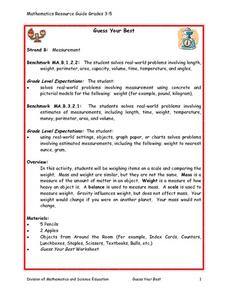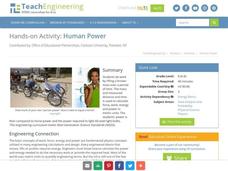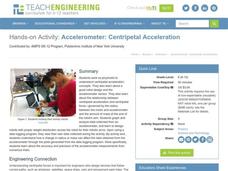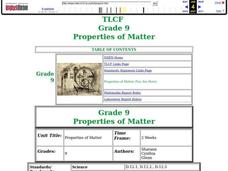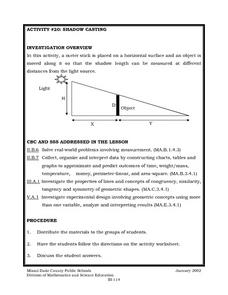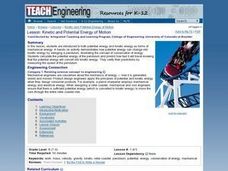Curated OER
Measuring the Speed of a Wave
Students create an experiment in which they measure the speed of a wave and record the data in a graph. They work in small groups to write the procedure for the experiment and share it with another group for cross checking of the...
Curated OER
Guess Your Best
Students discuss situations when it is useful to know exact weight of object as opposed to estimated weight, estimate weight of various items, weigh them on scale using ounces and pounds, and compare their weights on Guess Your Best...
Curated OER
Weighing stations
Learners work at a variety of stations involving practical measuring tasks. Estimation skills and the ability to measure accurately using kilograms and grams are developed.
Curated OER
The Effects of Meteor Impacts
Young scholars investigate meteor impacts on the Earth's surface by using different size balls and charting their impacts, given their diameter and mass.
Teach Engineering
Human Power
How many humans does it take to power a light bulb? The 10th part of a 25-lesson Energy Systems and Solutions unit has learners conduct an experiment to calculate power. They then use the results to determine how many classmates they...
Teach Engineering
Accelerometer: Centripetal Acceleration
Scholars build robotic arms that swing back and forth and use them to collect velocity and acceleration data. To analyze the results, pupils compare data to the equations for angular velocity and centripetal acceleration.
Curated OER
Sippin' on Smoothies
Why is calcium good for the body? Where is it stored? Young chefs discover the importance of calcium and review a list of foods that are rich in the material. They then make delicious smoothies high in calcium! Teaching kids how to make...
Discovery Education
Cool It!
Adjust the melting time of ice without varying the temperature! Learners experiment with different materials to decide how the materials affect the rate an ice cube melts. They then connect their findings to the conductivity of each...
Pennsylvania Department of Education
Build What I've Created
n this geometric lesson, students define and identify two dimensional shapes based on their attributes. They complete worksheets based on the geometric concepts.
Curated OER
Introduction to the Mole
Learners are introduced to the mole concept using a discovery-based method. Lesson includes activities with candy that allow students to discover the rules for mole-item, item-mole, mole-mass, and mass-mole conversions.
Curated OER
Acceleration of Gravity with Pendulums
Students explore, analyze and study to see whether the length of a pendulum affects its period and whether the mass of a pendulum affects its period. They review and discuss a lengthy list of math definitions and experiment with tables...
Curated OER
Properties of Matter
Ninth graders explore the molecular structure of matter and how it can affect the physical characteristics of a specific material. They demonstrate that isotopes of an element have different masses. Students demonstrate that the rates of...
Curated OER
The Metric System
Students practice converting metric measurements by completing the activities listed in this lesson. They first practice measuring common objects. They then convert metric measurements using the included worksheet.
Curated OER
Pacing a Gunther Chain
Young scholars pace a Gunther Chain, a measurement used by foresters to determine distance and area. They discuss that pacing is individualized depending on age, gender, etc. They practice to find an average pace. Teams estimate, pace...
Curated OER
Everybody Needs a Rock
Students describe and classify rocks that they have chosen. They estimate and find the mass of their rocks.
Curated OER
Shadow Casting
Eighth graders use a meter stick that is placed on a horizontal surface and an object is moved along it so that the shadow length can be measured at different distances from the light source. They solve real-world problems involving...
Curated OER
Statistics with M&Ms
Seventh graders explore estimation, measurement, and probability. Students conduct surveys and create charts & graphs. They study the history of chocolate. Students design their own magazine advertisement or create a script for a...
Curated OER
Obesity
Class members participate in a discussion, read a newspaper article, and participate in activities meant to open their eyes to the problem of obesity in the US. There are resource links, electronic worksheets, and teacher's notes to help...
Curated OER
temperature and the Scientific Method Lesson Plan
Sixth graders study heat, temperature, and heat transfer. Using probeware, the teacher demonstrates boiling points. Students participate in experiments and record the beginning and ending temperatures and mass of objects. After...
Curated OER
Introducing Ideas about Inheritance
Is it nature or nurture? In an easily adaptable kinesthetic activity to introduce genetics, learners group themselves based on a variety of categories. They will quickly find that some characteristics are easy to put in order, while...
Curated OER
Sum of the Parts
Fifth graders build objects using various materials. They estimate the weight of the object using individual building pieces. Then they weigh the actual object and then tear it apart and weigh the pieces. They compare the two weights.
Curated OER
TE Lesson: Kinetic and Potential Energy of Motion
Young scholars investigate the difference between potential and kinetic energy. They examine the formulae associated with both types of energy. They complete how quickly a pendulum with swing by converting potential energy into kinetic...
Curated OER
Measurement
Students use arithmetic in a practical situation using time and distance.
As the calculations involved in this problem involve single digit addition and multiplication it offers a good opportunity to encourage the students's use of...
Curated OER
Mathematical and Chemical Relationships of Stoichiometric Problems
Students review key words used in stoichiometry such as mole, molar mass, Avogadro's number, and mass - mole relationships. They participate in a series of small experiments to explore solving stoichiometry problems in the laboratory.



